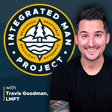
Embracing Vulnerability: Integrated Parenting and Personal Growth (feat. Jon Fogel)
In our latest episode, Jon Fogel joins us to dive deep into the nuances of **emotional health and holistic parenting** from a dad's perspective. As a father to three boys and an influential voice in the parenting creator space, Jon sheds light on the challenges and triumphs of nurturing a healthy emotional environment at home.
Here are three key takeaways from this profound discussion:
- **Integration of Emotions**: Understanding and integrating your fears and vulnerabilities is crucial for emotional health. Jon emphasizes that facing these aspects can lead to a fuller and more authentic life.
- **Impact of Male Cultural Norms**: We explore how societal expectations around masculinity affect emotional development and expression, often leading men to suppress their feelings. This suppression can have far-reaching consequences, including on family dynamics and personal growth.
- **The Role of Apologies in Healing**: The power of acknowledging mistakes and apologizing, especially from adults to children, is monumental in mending and strengthening relationships. It’s a step towards breaking cycles of emotional suppression and trauma.
Don’t miss this insightful conversation aimed at inspiring not just dads, but all parents to foster a home environment where emotions are respected and nurtured rather than shunned or ignored. Perfect for anyone interested in personal growth, healthier family dynamics, and emotional resilience.
🔗 **Listen now to get inspired and maybe even transform your approach to parenting and personal well-being!**
#Parenting #EmotionalHealth #Masculinity #PersonalGrowth #TheIntegratedManProject #JonFogel #Podcast
SUPPORT THE SHOW:
JOIN THE MAILING LIST & GET INVOLVED!
WATCH ON YOUTUBE:
Connect and Support Jon:
IG: wholeparent
Web: www.wholeparentacademy.com
Connect and Support Travis:
YouTube: Travis Goodman
Instagram: @integratedmanproject
Check out the Website: TBD





